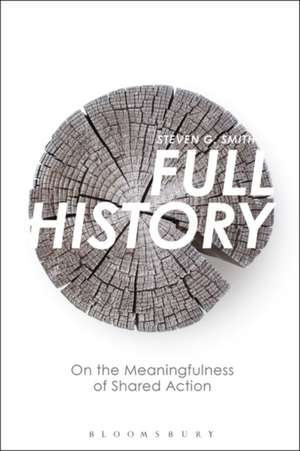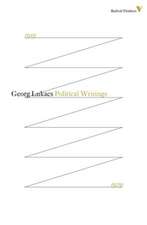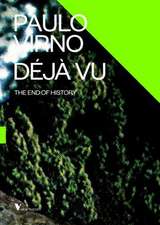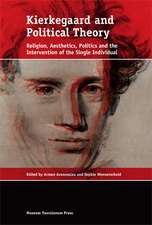Full History: On the Meaningfulness of Shared Action
Autor Steven G. Smithen Limba Engleză Hardback – 14 dec 2016
| Toate formatele și edițiile | Preț | Express |
|---|---|---|
| Paperback (1) | 225.67 lei 6-8 săpt. | |
| Bloomsbury Publishing – 16 sep 2020 | 225.67 lei 6-8 săpt. | |
| Hardback (1) | 774.12 lei 6-8 săpt. | |
| Bloomsbury Publishing – 14 dec 2016 | 774.12 lei 6-8 săpt. |
Preț: 774.12 lei
Preț vechi: 1113.14 lei
-30% Nou
Puncte Express: 1161
Preț estimativ în valută:
148.13€ • 158.40$ • 123.51£
148.13€ • 158.40$ • 123.51£
Carte tipărită la comandă
Livrare economică 17 aprilie-01 mai
Preluare comenzi: 021 569.72.76
Specificații
ISBN-13: 9781474260329
ISBN-10: 1474260322
Pagini: 264
Dimensiuni: 156 x 234 x 25 mm
Greutate: 0.54 kg
Editura: Bloomsbury Publishing
Colecția Bloomsbury Academic
Locul publicării:London, United Kingdom
ISBN-10: 1474260322
Pagini: 264
Dimensiuni: 156 x 234 x 25 mm
Greutate: 0.54 kg
Editura: Bloomsbury Publishing
Colecția Bloomsbury Academic
Locul publicării:London, United Kingdom
Caracteristici
Ambitious and original philosophical analysis of the practical importance of history, how we as a society conceptualize it, and our judgement of its significance
Notă biografică
Steven G. Smith is Jennie Carlisle Golding Professor of Philosophy at Millsaps College, USA and the author of The Concept of the Spiritual (1988), Gender Thinking (1992), Worth Doing (2004), and Appeal and Attitude (2005).
Cuprins
PrefaceAcknowledgementsIntroduction1What Is Historical Meaningfulness?Toward full history: historical senseToward fullest history: historical meaningfulnessEvasions and reductions of history thinkingHistorical realism in practical evaluation2How Is History Real?Archetypalism and experientialismHow action sharing is real3How Is History Interesting?Being interested in "history" and the historicalThree modes of historical interestThree openings of historical interestThe most interesting new histories, #1: Natural historyThe most interesting new histories, #2: Feminist historyThe most interesting new histories, #3: Sports history4How Is History Important?Historical importanceThe totalizing and chaotic views of historical mattering: Sartre and FoucaultTheses on historical importance5How Is History Understandable?Historical insight and historical judgmentConditions of insight into shared actionThe practical continuum as spiritualThe game model of the practical continuumIs there such a thing as good historical judgment?The classic historical judgment of JeremiahThe modern historical judgment of Hannah Arendt6How Can History Be Made?The possibility of "making" historyThe movement idealThe problem of "historical injustice"The problem of totalizingFour modes of history makingThe universal history maker 7How Can History Have an Aim?Three historical goals: Utopia, Victory, SalvationThe best world and bad outcomesThree themes of historical fulfillment: Freedom, Solidarity, RedemptionHistory as sacredEpilogue: Difficult HistoryNotesIndex
Recenzii
Smith's book is provocative and so broad in its scope that it seems to want to exemplify the idea of full history. It forces us to think about the idea of fullness, of comprehensiveness, and of what the limitations of history actually are. It has much to tell us about historical inquiry and the historical thinking that lies behind it and leads to it. In the idea of shared action, the author has found a topic that deserves the attention he gives it.
This book offers a startlingly original approach to the question: what are the uses and abuses of history? In clear, clean prose, Smith reveals how history informs the human project of world-making through shared action. The result illuminates the nature of history in surprising and stimulating ways. This is a must read for anyone interested in the nature of history and its role in our collective lives.
Full History is an ambitious and important book. It is philosophy of history in the grand manner, such as we have not seen since the middle decades of the last century. Steven Smith breathes new life into the genre, which, as he demonstrates, has always been less about epistemological questioning about the past than about how to live a historically-informed life in the present, in concert with others. Smith's breathtaking erudition and ethical discernment create a new and urgent dialog with many of the major philosophical approaches to history, including those of Hegel, Sartre, Arendt, and Foucault. This capacious study is thus also a philosophical manifesto whose intuitions and proposals will reverberate for many years to come.
Smith's Full History is an ambitious and original attempt to penetrate into the deep connections between the historical past, present and future. It draws on a considerable breadth of historical examples and is informed by reasonableness and balance.
This book offers a startlingly original approach to the question: what are the uses and abuses of history? In clear, clean prose, Smith reveals how history informs the human project of world-making through shared action. The result illuminates the nature of history in surprising and stimulating ways. This is a must read for anyone interested in the nature of history and its role in our collective lives.
Full History is an ambitious and important book. It is philosophy of history in the grand manner, such as we have not seen since the middle decades of the last century. Steven Smith breathes new life into the genre, which, as he demonstrates, has always been less about epistemological questioning about the past than about how to live a historically-informed life in the present, in concert with others. Smith's breathtaking erudition and ethical discernment create a new and urgent dialog with many of the major philosophical approaches to history, including those of Hegel, Sartre, Arendt, and Foucault. This capacious study is thus also a philosophical manifesto whose intuitions and proposals will reverberate for many years to come.
Smith's Full History is an ambitious and original attempt to penetrate into the deep connections between the historical past, present and future. It draws on a considerable breadth of historical examples and is informed by reasonableness and balance.













